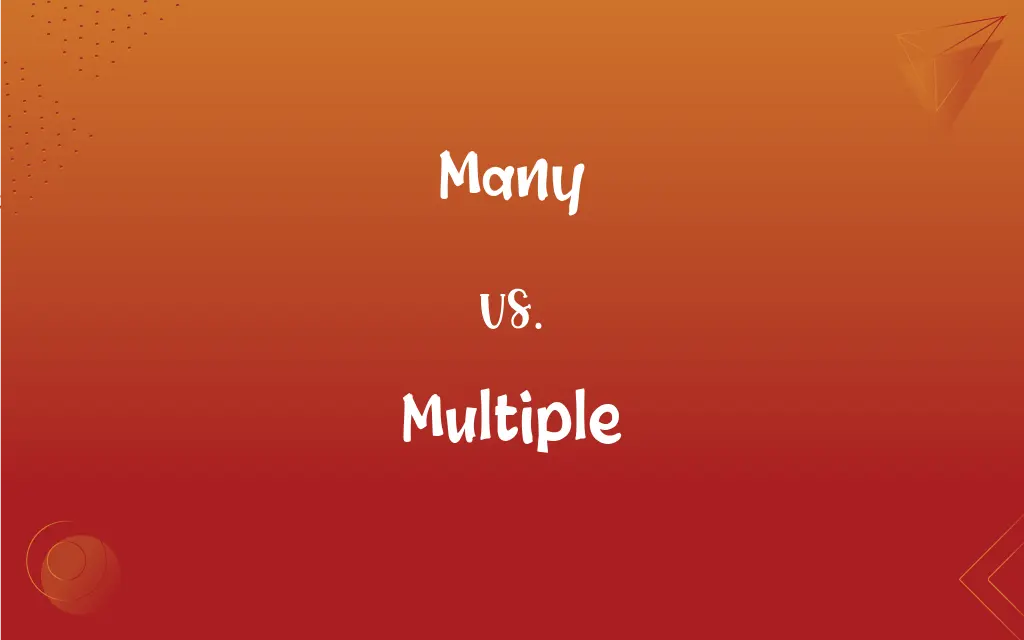Many vs. Multiple: What's the Difference?
Edited by Aimie Carlson || By Janet White || Updated on October 3, 2023
"Many" denotes a large number of items or people, while "multiple" refers to numerous separate or distinct instances or items.

Key Differences
"Many" and "Multiple," though seemingly similar, differ in their usage and connotations. "Many" is an adjective often used to describe a large number of items or people. It is usually applied to countable nouns and gives a sense of abundance. For instance, if someone says they have many friends, they are emphasizing a large number of friends without specifying the exact number. "Multiple," on the other hand, is an adjective that highlights the existence of numerous distinct items or instances. It essentially means "more than one" and is often associated with separate or distinct items.
Consider the sentences: "She has many dresses," and "She has multiple dresses in her wardrobe." While both sentences convey the idea of a plurality of dresses, "many" leans more towards an idea of abundance, while "multiple" leans towards distinctness. This difference might appear subtle, but it becomes clearer with usage and context. For instance, saying "She has many health issues" might sound more concerning than saying "She has multiple health issues," which might imply distinct but manageable conditions.
Another point of distinction is the context of use. "Many" is generally used in more casual, colloquial settings, while "multiple" finds its place in more formal or specific contexts. If someone were talking casually about their holiday experiences, they might say, "I visited many countries." In a more formal setting, like a report or an official account, one might use "multiple" to say, "The organization has branches in multiple countries."
In summary, while both "many" and "multiple" denote more than one, "many" emphasizes quantity and abundance, and "multiple" emphasizes distinctness and separate instances.
Comparison Chart
Type
Adjective
Adjective
ADVERTISEMENT
Connotation
Abundance
Distinctness
Usage
Describes a large number
Refers to more than one distinct item or instance
Context
More colloquial
More formal
Association
Countable nouns
Distinct items or instances
Many and Multiple Definitions
Many
Numerous; several.
Many times, he has proven his point.
ADVERTISEMENT
Multiple
More than one in number.
She holds multiple degrees.
Many
A multitude of.
Many stars are visible in the night sky.
Multiple
Having or involving several parts, elements, or members.
He has multiple interests.
Many
A large number of.
Many people attended the concert.
Multiple
Having multiple functions or aspects.
This tool has multiple uses.
Many
Amounting to or consisting of a large indefinite number
Many friends.
Multiple
Various; diverse.
The reasons for the decision were multiple.
Many
Being one of a large indefinite number; numerous
Many a child.
Many another day.
Multiple
Consisting of, having, or involving several or many individuals.
A business with multiple locations.
Many
The majority of the people; the masses
"The many fail, the one succeeds" (Tennyson).
Multiple
Having, relating to, or consisting of more than one individual, element, part, or other component; manifold.
Many
A large indefinite number
A good many of the workers had the flu.
Multiple
A number that may be divided by another number with no remainder
4, 6, and 12 are multiples of 2.
Many
An indefinite large number of.
Not many such people enjoyed playing chess.
There are very many different ways to cook a meal.
Multiple
More than one (followed by plural).
My Swiss Army knife has multiple blades.
Many
(in combinations such as 'as many', 'so many', 'this many') Used to indicate, demonstrate or compare the number of people or things.
We don't need this many bananas. Put some back.
There may be as many as ten million species of insect.
I don't have as many friends as my sister does.
Multiple
Having more than one element, part, component, or function, having more than one instance, occurring more than once, usually contrary to expectations (can be followed by a singular).
Some states do explicitly prohibit multiple citizenship.
It was a multiple pregnancy: the woman had triplets.
Multiple registrations are an increasing problem for many social networking sites.
Many
An indefinite large number of people or things.
Many are called, but few are chosen.
Multiple
(mathematics) A whole number that can be divided by another number with no remainder.
Many
A multitude; a great aggregate; a mass of people; the generality; the common herd.
Democracy must balance the rights of the few against the will of the many.
Multiple
(finance) Price-earnings ratio.
Many
A considerable number.
Multiple
One of a set of the same thing; a duplicate.
Many
Existing in large number; numerous.
Multiple
A single individual who has multiple personalities.
Many
A retinue of servants; a household.
Multiple
One of a set of siblings produced by a multiple birth.
Many
The populace; the common people; the majority of people, or of a community.
After him the rascal many ran.
Multiple
A chain store.
Many
A large or considerable number.
A many of our bodies shall no doubtFind native graves.
Seeing a great many in rich gowns.
It will be concluded by many that he lived like an honest man.
He is liable to a great many inconveniences.
Multiple
A discovery resulting from the work of many people throughout history, not merely the work of the person who makes the final connection.
Many
Consisting of a great number; numerous; not few.
Thou shalt be a father of many nations.
Not many wise men after the flesh, not many mighty, not many noble, are called.
Multiple
More than one piercing in a single ear.
Many
A quantifier that can be used with count nouns and is often preceded by `as' or `too' or `so' or `that'; amounting to a large but indefinite number;
Many temptations
The temptations are many
A good many
A great many
Many directions
Take as many apples as you like
Too many clouds to see
Never saw so many people
Multiple
Containing more than once, or more than one; consisting of more than one; manifold; repeated many times; having several, or many, parts.
Many
Constituting or forming a large number.
He made many mistakes in his work.
Multiple
A quantity containing another quantity an integral number of times without a remainder.
Many
A significant quantity.
She has read many books on the subject.
Multiple
The product of a quantity by an integer;
36 is a multiple of 9
Multiple
Having or involving or consisting of more than one part or entity or individual;
Multiple birth
Multiple ownership
Made multiple copies of the speech
His multiple achievements in public life
Her multiple personalities
A pineapple is a multiple fruit
FAQs
Is "many" only used for countable nouns?
Yes, "many" is typically used with countable nouns, while "much" is used for uncountable nouns.
Which is more formal, "many" or "multiple"?
"Multiple" tends to be more formal than "many."
Can "multiple" mean "dual" or "two"?
"Multiple" generally means more than one, but it doesn't specify a number. "Dual" specifically means two.
Can "many" and "multiple" be used interchangeably?
Not always. While both indicate more than one, context and emphasis can determine the best choice.
Is "many a time" a correct phrase?
Yes, "many a time" is an idiomatic expression meaning "often."
Can "multiple" be used as a noun?
Yes, in mathematics, for instance, "12 is a multiple of 6."
Which is more emphatic, "many" or "multiple"?
"Many" tends to emphasize abundance, while "multiple" emphasizes distinctness.
How is "multiple" used in mathematics?
In math, "multiple" refers to the product of a number and an integer.
Is "many" always about large numbers?
Not necessarily. It signifies a significant quantity relative to context.
What's the opposite of "multiple"?
"Single" is an opposite in many contexts.
Are there synonyms for "many"?
Yes, synonyms include numerous, a lot of, and several.
Can "many" describe an emotion's intensity?
Not directly. Phrases like "many times" can stress frequency, affecting the perceived intensity.
Can you say "multiple many times"?
It's redundant. Choose one for emphasis based on context.
Can "many" be used in negative contexts?
Yes, as in "not many" or "many do not agree."
What's the opposite of "many"?
"Few" is often used as an opposite to "many."
How does "multiple" relate to "multiply"?
Both come from the same root, with "multiple" being a result of multiplication.
Is "many" an old English word?
Yes, "many" has Old English origins.
Does "multiple" always indicate variety?
Not necessarily. It indicates more than one, which could be of the same kind.
Are there synonyms for "multiple"?
Yes, synonyms include several, various, and manifold.
Can "multiple" refer to diseases?
Yes, as in "multiple sclerosis," where it means "many" or "various" lesions or affected areas.
About Author
Written by
Janet WhiteJanet White has been an esteemed writer and blogger for Difference Wiki. Holding a Master's degree in Science and Medical Journalism from the prestigious Boston University, she has consistently demonstrated her expertise and passion for her field. When she's not immersed in her work, Janet relishes her time exercising, delving into a good book, and cherishing moments with friends and family.
Edited by
Aimie CarlsonAimie Carlson, holding a master's degree in English literature, is a fervent English language enthusiast. She lends her writing talents to Difference Wiki, a prominent website that specializes in comparisons, offering readers insightful analyses that both captivate and inform.
































































